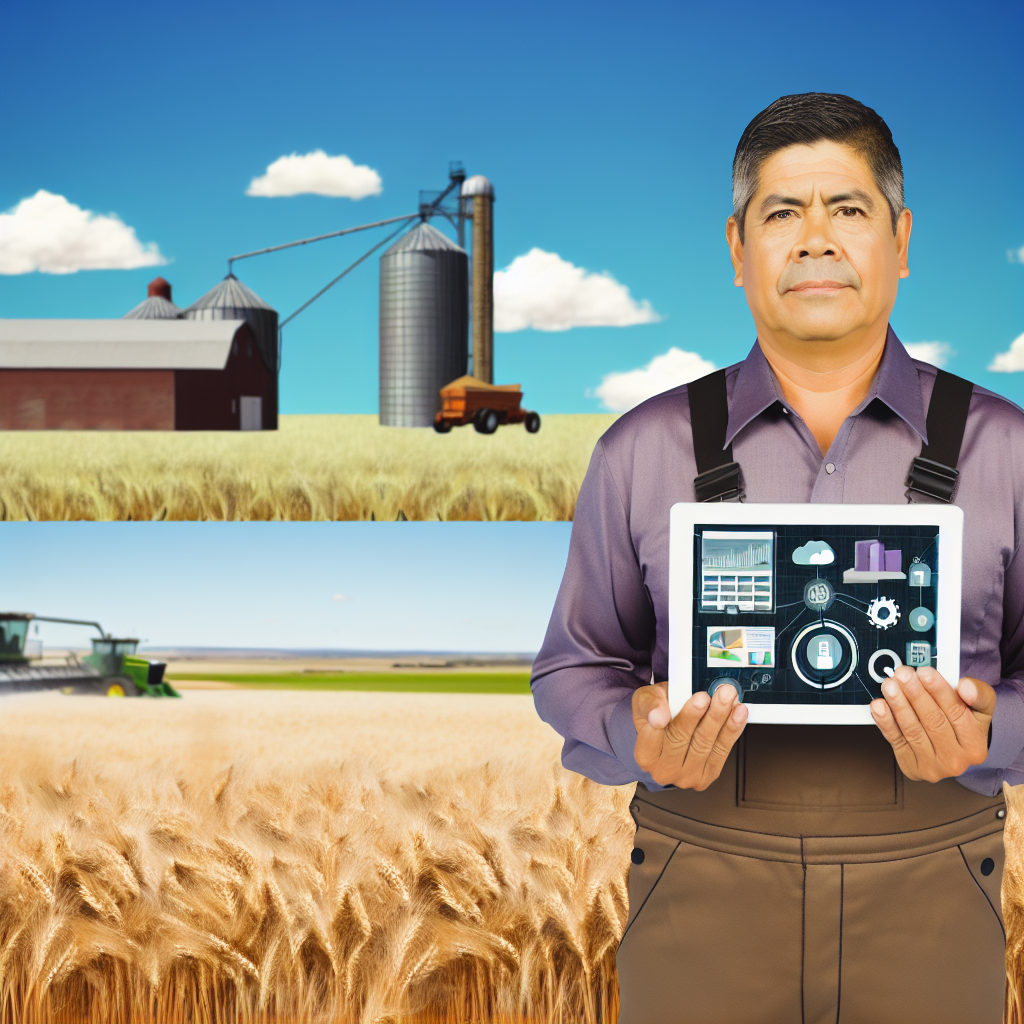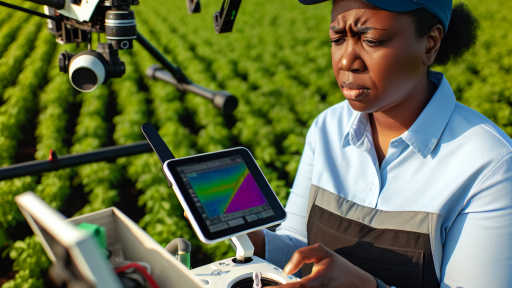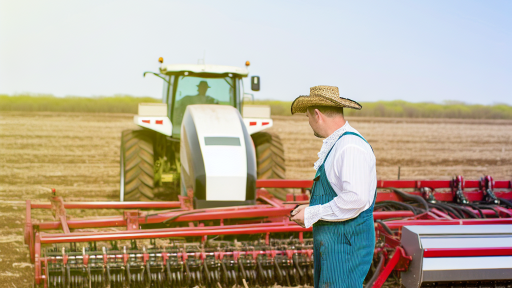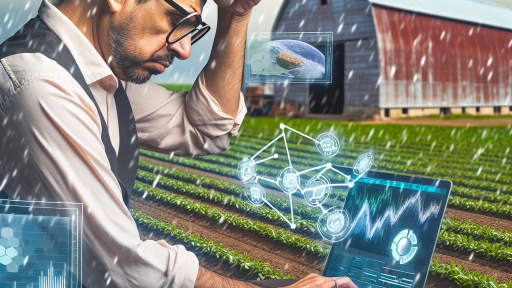Introduction to Agri-Fintech and Its Significance in Agriculture
Agri-Fintech combines agriculture and financial technology.
This innovative sector changes how farmers access financing.
Traditionally, farmers faced numerous barriers to securing loans.
High interest rates and lengthy application processes were common issues.
Agri-Fintech tools provide solutions to these problems.
The Role of Technology in Financing
By leveraging mobile apps and digital platforms, Agri-Fintech expands access.
Farmers can apply for loans quickly from their smartphones.
This convenience drastically reduces time and effort needed for financing.
Moreover, data analytics help evaluate creditworthiness efficiently.
As a result, farmers with limited credit histories can still qualify.
Enhancing Financial Inclusion
Agri-Fintech is vital for promoting financial inclusion in agriculture.
Many smallholder farmers lacked access to traditional banking services.
Now, innovative fintech solutions bridge that gap.
For instance, microloans are offered directly through digital platforms.
This allows farmers to obtain necessary funds directly and affordably.
Transform Your Agribusiness
Unlock your farm's potential with expert advice tailored to your needs. Get actionable steps that drive real results.
Get StartedImproving Risk Management
Furthermore, Agri-Fintech enhances risk management for farmers.
Weather-based insurance products give farmers greater security.
Technology helps identify risks and recommend suitable insurance options.
Thus, farmers can protect their investments against unexpected events.
Building Stronger Farmer Communities
Agri-Fintech also fosters collaboration among farmers.
Online platforms enable them to share resources and knowledge.
This community support leads to more informed financial decisions.
As farmers succeed, they inspire others to follow suit.
Consequently, whole communities benefit from improved financial health.
Overview of Traditional Credit Access Challenges Faced by Farmers
Farmers face numerous challenges when accessing traditional credit.
These challenges often stem from the perceived risks associated with agriculture.
Many financial institutions view farming as a high-risk investment.
Consequently, banks and lenders impose strict requirements for loans.
Farmers usually need to provide collateral for their loans.
However, many smallholders lack sufficient assets to meet these requirements.
This leads to a lack of credit for those who need it the most.
Credit history is another barrier for farmers.
Many farmers do not have a formal credit history to present to lenders.
This makes it difficult for them to secure loans for essential operations.
Additionally, the bureaucratic processes can be daunting.
Farmers often struggle with complex documentation and lengthy application procedures.
This results in disappointing rates of loan approval.
Moreover, the prevailing interest rates can be prohibitive.
Many loans come with high-interest rates that further burden farmers.
Showcase Your Farming Business
Publish your professional farming services profile on our blog for a one-time fee of $200 and reach a dedicated audience of farmers and agribusiness owners.
Publish Your ProfileAs a result, some may choose to forgo credit altogether.
These factors create a significant gap in financial support for farmers.
Ultimately, these challenges hinder agricultural productivity and growth.
How Agri-Fintech Platforms Are Transforming Access to Credit
Introduction to Agri-Fintech
Agri-Fintech combines agriculture and financial technology.
This integration helps farmers access vital financial services.
Additionally, Agri-Fintech platforms simplify the borrowing process.
Digital Platforms for Credit Access
Many startups focus on delivering digital solutions for farmers.
Farmers can apply for loans through user-friendly apps.
These platforms quickly assess creditworthiness using data analytics.
Consequently, farmers receive faster decisions on their loan applications.
Tailored Financial Products
Agri-Fintech companies design financial products specifically for farmers.
They consider factors such as crop cycles and harvest seasons.
This tailored approach makes loan repayment plans more manageable.
Furthermore, it increases the likelihood of loan approval.
Alternative Credit Scoring
Traditional credit scores often exclude smallholder farmers.
Agri-Fintech platforms utilize alternative data for credit assessments.
They may include transaction histories or farm outputs.
This innovation expands credit access to a broader range of farmers.
Partnerships with Financial Institutions
Many Agri-Fintech platforms collaborate with banks and microfinance institutions.
These partnerships facilitate increased capital flow to farmers.
They also enhance trust in the digital lending process.
As a result, farmers gain access to a wider range of financing options.
Empowering Financial Literacy
Agri-Fintech initiatives often include financial education components.
They provide resources to help farmers make informed decisions.
As farmers improve their financial skills, they become better borrowers.
This empowerment promotes responsible borrowing and investing practices.
Case Studies of Successful Agri-Fintech Implementations
Numerous Agri-Fintech startups are making strides in various regions.
For instance, AgroLoan in Kenya connects farmers with credit providers.
Similarly, CropFunds in India offers tailored loan products.
Both platforms exemplify the potential of Agri-Fintech in fostering financial inclusivity.
Future Trends in Agri-Fintech
As technology evolves, Agri-Fintech will likely expand its offerings.
We may see enhanced AI-driven analytics in credit scoring.
Blockchain technology could also increase transparency in transactions.
Ultimately, these advancements will further improve access to credit.
Delve into the Subject: The Impact Of Biotechnology On Sustainable Farming
Technological Innovations Driving Agri-Fintech Solutions
Mobile Payment Systems
Mobile payment solutions empower farmers to access financing easily.
These systems simplify transactions between farmers and lenders.
Moreover, they enable quick fund transfers via smartphones.
Farmers no longer need to navigate complex banking infrastructures.
Data Analytics for Credit Scoring
Advanced data analytics enhance credit scoring for farmers.
Showcase Your Farming Business
Publish your professional farming services profile on our blog for a one-time fee of $200 and reach a dedicated audience of farmers and agribusiness owners.
Publish Your ProfileThey analyze various metrics such as weather patterns and soil health.
Thus, lenders can assess risk more accurately.
Consequently, more farmers qualify for credit options.
Blockchain Technology
Blockchain technology introduces transparency in Agri-Fintech.
This fosters trust between farmers and financial institutions.
Each transaction gets recorded securely and immutably.
As a result, fraud and disputes are significantly reduced.
Fintech Platforms Connecting Farmers to Investors
Fintech platforms create direct links between farmers and investors.
This reduces reliance on traditional banks for financing.
Additionally, crowdfunding models allow farmers to present their projects.
Investors find opportunities to support local agriculture directly.
Artificial Intelligence and Machine Learning
Artificial intelligence and machine learning revolutionize financial assessments.
These technologies analyze vast amounts of agricultural data.
They identify trends and predict future agricultural outputs.
Consequently, lenders make informed decisions based on real data.
Remote Sensing and Precision Agriculture
Remote sensing technologies provide valuable insights into crop health.
Farmers can monitor conditions using satellite imagery and drones.
This information helps them optimize resource allocation.
As a result, they demonstrate higher productivity to lenders.
Explore Further: Choosing The Right Automated Machinery For Your Farm
Case Studies of Successful Agri-Fintech Companies and Their Impact
Agritech Solutions
Agritech Solutions has transformed how farmers access finance.
They leverage machine learning to assess creditworthiness efficiently.
This company has extended credit to over 15,000 farmers.
Their platform analyzes farming data to predict yield outcomes.
Consequently, farmers can secure loans based on projected earnings.
FarmFunds
FarmFunds connects farmers with investors seeking sustainable opportunities.
Their online marketplace allows farmers to showcase their projects.
This innovative approach has raised millions in funding.
FarmFunds focuses on organic and eco-friendly farming practices.
As a result, farmers committed to sustainability find essential backing.
AgriLoan Network
AgriLoan Network simplifies the loan application process for farmers.
Their platform matches farmers with various financial institutions.
They provide personalized loan options based on individual needs.
This company highlights the importance of quick access to funds.
Farmers report increased crop yields due to timely financing.
Green Finance Initiative
Green Finance Initiative promotes sustainable agricultural practices through funding.
Their focus is on projects that enhance environmental preservation.
They partner with local governments to support rural communities.
This initiative has funded over 200 sustainable farming projects globally.
Farmers benefit from low-interest loans and grants tailored to their needs.
Showcase Your Farming Business
Publish your professional farming services profile on our blog for a one-time fee of $200 and reach a dedicated audience of farmers and agribusiness owners.
Publish Your ProfileQuote from Industry Expert
Dr. Emily Chang, an agri-tech expert, emphasizes the trend.
“Agri-fintech is crucial for young farmers facing financial barriers,” she states.
Her research shows a positive correlation between technology and access to credit.
Investments in agri-fintech create resilient farming communities.
Future Outlook
The growth of agri-fintech represents a paradigm shift.
As more farmers gain access to capital, productivity will rise.
Innovative financial solutions will further bridge the rural finance gap.
Ultimately, this evolution supports food security and economic growth.
Gain More Insights: Securing Agricultural Supply Chains With Blockchain Technology

The Role of Data Analytics in Reducing Credit Risk for Lenders
Understanding Credit Risk
Credit risk significantly impacts lending decisions in agriculture.
Lenders must evaluate the likelihood of farmer defaults.
Data analytics provides insights into this risk assessment.
Data-Driven Decision Making
Farmers generate vast amounts of data through their operations.
This data includes crop yields, soil health, and weather patterns.
Lenders can analyze this data to make informed credit decisions.
Moreover, predictive analytics can forecast future performance.
This enhances the lender’s understanding of potential risks.
Improved Credit Scoring Models
Traditional credit scores often overlook agricultural specifics.
Data analytics enables the development of tailored credit scoring models.
These models account for unique risk factors relevant to farmers.
Additionally, they can adapt over time with new data inputs.
Real-Time Monitoring
Data analytics allows for continuous monitoring of borrower performance.
Lenders can track key metrics in real-time.
This helps them respond quickly to emerging risks.
Consequently, proactive measures can be taken to mitigate issues.
Case Studies and Examples
Many successful agri-fintech companies leverage data analytics.
For instance, AgriCredit has significantly improved its risk models.
Similarly, GreenLeaf Financial uses real-time data to assess creditworthiness.
These companies demonstrate the tangible benefits of data analytics.
Challenges and Considerations
Despite its advantages, using data analytics poses challenges.
Data privacy and security remain top concerns for stakeholders.
Moreover, data accuracy must be ensured for reliable insights.
Finally, lenders need to invest in technology and training.
Find Out More: Sustainable Farming Practices With GM Crops
Regulatory Challenges and Opportunities for Agri-Fintech Growth
Understanding the Regulatory Landscape
Agri-fintech operates within a complex regulatory framework.
These regulations vary by country and often create challenges for startups.
Policies regarding agricultural financing can impact how funds are distributed.
Additionally, the regulatory environment often requires compliance with financial laws.
Therefore, understanding local regulations is crucial for success.
Key Regulatory Challenges
One major challenge involves stringent loan approval processes.
Showcase Your Farming Business
Publish your professional farming services profile on our blog for a one-time fee of $200 and reach a dedicated audience of farmers and agribusiness owners.
Publish Your ProfileThese processes can delay financing for farmers in need.
Moreover, regulatory bodies may require extensive documentation.
This paperwork can deter farmers from seeking loans.
Furthermore, many agri-fintech companies face licensing obstacles.
Regulatory bodies may impose limits on operating regions.
As a result, startups struggle to scale their services.
Identifying Opportunities in Regulatory Frameworks
Despite challenges, regulatory frameworks can present opportunities.
For instance, governments increasingly recognize the importance of agri-fintech.
Some countries have started to implement supportive policies.
These policies aim to facilitate easier access to credit for farmers.
Additionally, partnerships with governmental organizations can be beneficial.
Such collaborations may lead to streamlined regulatory processes.
Adapting to Changes in Regulation
The regulatory environment is continuously evolving.
Agri-fintech companies must stay informed about changes.
Flexibility in operations can help them adapt quickly.
Moreover, engaging with regulators can highlight industry needs.
This proactive approach builds trust and fosters collaboration.
The Future of Agri-Fintech Regulation
Looking ahead, regulatory bodies may enhance standards for agri-fintech.
Improved regulations can create more competitive landscapes.
This change could encourage innovation within the sector.
Ultimately, streamlined regulations may benefit farmers significantly.
Access to fair and timely financing will drive agricultural productivity.
Future Trends in Agri-Fintech and Their Potential Effects on Farmers
Expansion of Data-Driven Lending
Data-driven lending will significantly reshape how farmers access credit.
Agri-Fintech companies will increasingly rely on big data analytics.
This approach enhances the credit assessment process for farmers.
Farmers can expect faster loan approvals and tailored financing options.
Moreover, advanced algorithms will reduce the risk of default.
Increased Adoption of Blockchain Technology
Blockchain technology is poised to offer transparency in transactions.
This feature will build trust between farmers and lenders.
Smart contracts will automate and secure agreements for loans.
As a result, farmers will have more reliable access to credit.
Additionally, this technology will lower costs associated with lending.
Crowdfunding and Peer-to-Peer Lending Growth
Crowdfunding platforms will emerge as significant financing sources.
Farmers can leverage these tools to raise capital for projects.
Peer-to-peer lending will also gain traction among agricultural communities.
This trend fosters a sense of community and shared responsibility.
Importantly, it opens new avenues for financial support for farmers.
Emphasis on Sustainable and Climate-Resilient Farming
Agri-Fintech will increasingly focus on sustainability initiatives.
Lenders will prioritize funding projects that promote eco-friendly practices.
Farmers who adopt sustainable methods will likely receive better financing terms.
Showcase Your Farming Business
Publish your professional farming services profile on our blog for a one-time fee of $200 and reach a dedicated audience of farmers and agribusiness owners.
Publish Your ProfileThis shift supports communities in coping with climate change impacts.
Consequently, it could lead to enhanced agricultural resilience overall.
Integration of Mobile Technology
Mobile technology will play a crucial role in accessing financial services.
Farmers will benefit from mobile apps offering real-time data and insights.
This access enables better financial decision-making on the go.
Furthermore, mobile payments will streamline transactions between farmers and lenders.
In essence, connectivity will empower farmers in managing their finances.
Additional Resources
Apollo Agriculture Raises $40M for African Farmers – CZI News




